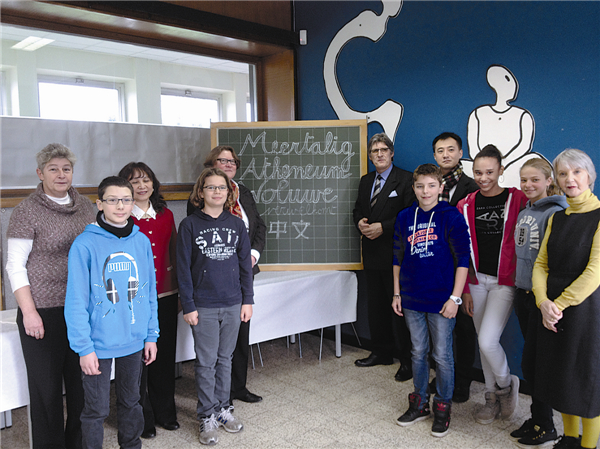 |
|
Chinese class staff and students from Koninklijk Atheneum Sint-Pieters-Woluwe middle school.TUO YANNAN / CHINA DAILY |
Rising demand
"During the past two years, the demand for Chinese has been the highest among all the language classes. That wasn't the case a few years ago, but now our biggest classes are for Chinese," said Eddy Johnson from the language training institute Scholengroep Brussel.
For many years, French, Russian and Spanish were the most popular courses among European Union and Commission staff, but as Johnson noted, Chinese and Arabic are now the languages of choice.
The Chinese class has about 60 students at different levels of proficiency, and the reasons for joining vary. One of the students, Demur Gaspard, who works for the European Commission, is learning Chinese to help him at work. "I deal mainly with Chinese affairs, so I'm learning the language for professional reasons," he said.
Apart from work-related reasons, many officials are learning Chinese for their own enjoyment. Tami Julien, director-general of development and cooperation at the European Commission, said his work mainly involves African issues, so for him learning Chinese is more about personal enjoyment.
One European Commission translator, who wanted to be known simply as Victor, has worked for international organizations for 25 years. He speaks fluent Spanish, Italian, English and French and is now learning Chinese: "I think Chinese is a very important language. I'm interested in learning about the country's culture and language. Also it's my obligation to stay up to date."
Many EU officials have hired Chinese-speaking assistants to better connect with the country. Pawel Bienkowski, a 26-year-old assistant to Wojciech Olejniczak, a Polish member of the European Parliament, enjoys greeting Chinese reporters in fluent Mandarin, while Victor Bostinaru, a member of the European Parliament and vice-chairman of the delegation for relations with China, has hired a Chinese assistant ahead of a trip to the country next month.
However, EU employees are not the only ones learning Chinese, and the implementation of language classes is one of the hottest topics among school boards and parents in many European schools.
"Three years ago, only three schools in the French-speaking areas of Belgium taught Chinese. Now the number has climbed to more than 30. In the Dutch-speaking areas, it used to be four, but now 19 universities and schools have set up Chinese language courses," explained Wang Luxin, counsellor to the education department of the Chinese embassy in Belgium.
Olaf Mertens, director of the 165-year-old French-speaking Institut de la Providence de Champion, added Chinese classes to the range of options at his middle school in 2011 in the hope that they will provide the children with a wider view of the world.
The school has 50 Chinese-language students, aged 12 to 15, and while the classes are not compulsory, many students have expressed a desire to learn the language and the school has received strong support from parents, he said.
Chinese teacher Chen Hsiu-yin, began her career in 2000. She visits the school once a week to teach a two-hour class, "I have received very positive feedback from the students, and they are all studying extremely hard," she said.
Another teacher in the city, Xie Xiaolin, taught English in East China's Zhejiang province before moving to Belgium in 1994. She began teaching Chinese in 2006.
"In recent years I have been much busier than before; every week I work four days, teaching four classes. From my own experience, I can see that the demand for Chinese has increased hugely," said Xie.
Androulla Vassiliou, European commissioner for education, culture, multilingualism, sport, media and youth, said she's proud of the commission's achievements in 2012 in terms of EU-China relations and confidently expects 2013 to be as conducive for fostering deeper, mutual understanding between the EU and the Chinese people.
|
|
|
|
|
|
|
|
